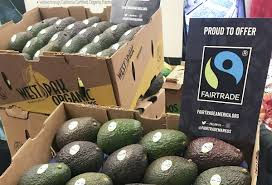Good food choices = a healthier you + a happier planet?
- Silvana Lucolli

- Jul 15
- 4 min read
Updated: Jul 20

Did you know your avocado habit could harm monarch butterflies?
It might be hard to believe, but our love for avocados could be putting one of nature’s most beautiful creatures at risk: the monarch butterfly.
Every winter, monarch butterflies travel thousands of miles from eastern North America to the mountain forests of Mexico. These forests are the butterflies’ safe haven during the colder months — but that sanctuary is now under threat.
In recent years, the growing demand for avocados has led to massive deforestation. By 2018, nearly 2,400 acres of land in the Monarch Butterfly Biosphere Reserve had been turned into avocado farms. Nearby forests have also been cut down, making the area less stable, more vulnerable to climate change, and less welcoming for the butterflies.
Monarch butterfly numbers have dropped by over 90% in just 20 years. They face many dangers — from disappearing habitats to harmful pesticides — so keeping their winter home in Mexico safe is more important than ever. In 2023, the U.S. imported a record 2.8 billion pounds of avocados, with Mexico supplying about 90% of that amount.

Avocado lovers can look for fair trade, organic and domestically grown avocados. Fair trade certification protects forests and independent producers.
The avocado expansion, It is not just danger for monarch populations but for 10 other species of endangered pollinators in Mexico, including lesser long-nosed bats, Mexican long-tongued bats, rufous hummingbirds and three species of bumble bees, although less than 1% of the avocados consumed in the United States are fair trade. Buying organic avocados supports smaller producers and safeguards workers and the environment from toxic chemicals.
This story is a powerful reminder that the food we choose impacts the planet. Even if you are not consuming avocados from Mexico, the monarch butterflies are a treasure of Earth´s natural resources. Yet something as simple as an avocado toast has a global footprint — and it’s up to us to make informed, responsible choices.


Will your next meal help build a better future? Take action at every meal. Follow these nature-inspired tips to reduce your impact and make every bite count—for your health and the Earth.
1. Eat More Plants Raising, animals for meat and dairy takes up a lot of land, water, and food. It also creates about 15% of the world’s greenhouse gas emissions. Meat consumption has grown a lot — it went up 500% between 1992 and 2016. To help the planet and our health, we should eat more plant-based foods and less meat and dairy.
2. Eat a Wider Variety of Foods Today, 75% of the world’s food comes from only 12 plants and 5 animals. This lack of variety can harm nature and make our food supply less secure. Eating a wider range of foods helps protect the environment. With Knorr, we’ve found 50 nutritious and sustainable foods — called the Future 50 Foods — that are better for both people and the planet.
3. Choose Seafood Responsibly, About 94% of the world’s fish stocks are either overfished or fished to their limit. Fish farms also come with challenges. But when done right, seafood can be good for people, nature, and the climate. Try eating different kinds of fish from well-managed sources, choose seafood lower on the food chain (like mussels or sardines), and pick options with a smaller carbon footprint. Need help? Check out our seafood tips!
4. Cut Down on Food Waste About 30% of all food produced is thrown away — that’s a huge waste and it’s harming the environment. In fact, if food waste were a country, it would be the third biggest polluter after China and the USA. The good news? You can make a difference at home. Freeze food you won’t eat right away, and buy loose fruits and vegetables so you only take what you need.
5. Grow Your Own Food There’s nothing better than eating something you grew yourself! Home-grown food is fresh, tasty, and good for you — and it doesn’t come with the pollution caused by transporting food to stores. Even growing a few herbs or veggies in pots can help.
6. Choose Products with RSPO-Certified Palm Oil Palm oil that isn’t grown sustainably causes big problems, like destroying forests and harming animals such as orangutans and tigers. It also adds to climate change. But avoiding palm oil completely isn’t always the answer — many substitutes are even worse for the planet. Instead, look for products made with RSPO-certified sustainable palm oil, which helps protect nature while meeting our needs.
7. Say No to Plastic Plastic is everywhere — in nature, in the ocean, and even in the food we eat. You can help reduce the problem by making a few simple changes. Bring a reusable bag when you go shopping, choose fruits and veggies without packaging when you can, and encourage brands and stores to use less plastic and switch to better options.
8. Eat What’s in Season
Try to eat fruits and vegetables that are in season and grown locally. This supports local farmers, is better for the environment, and often tastes fresher too. Plus, shopping at local farm shops or markets can help you discover new foods and get great cooking tips. Not sure what’s in season? Use a seasonal food calendar to find out!

Because we all consume food our connection with Nature begins on our plates. I hope these tips, inspired by harmony between people and the planet, can help you eat more mindfully and sustainably.
Inspired by wwf.uk





コメント